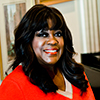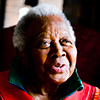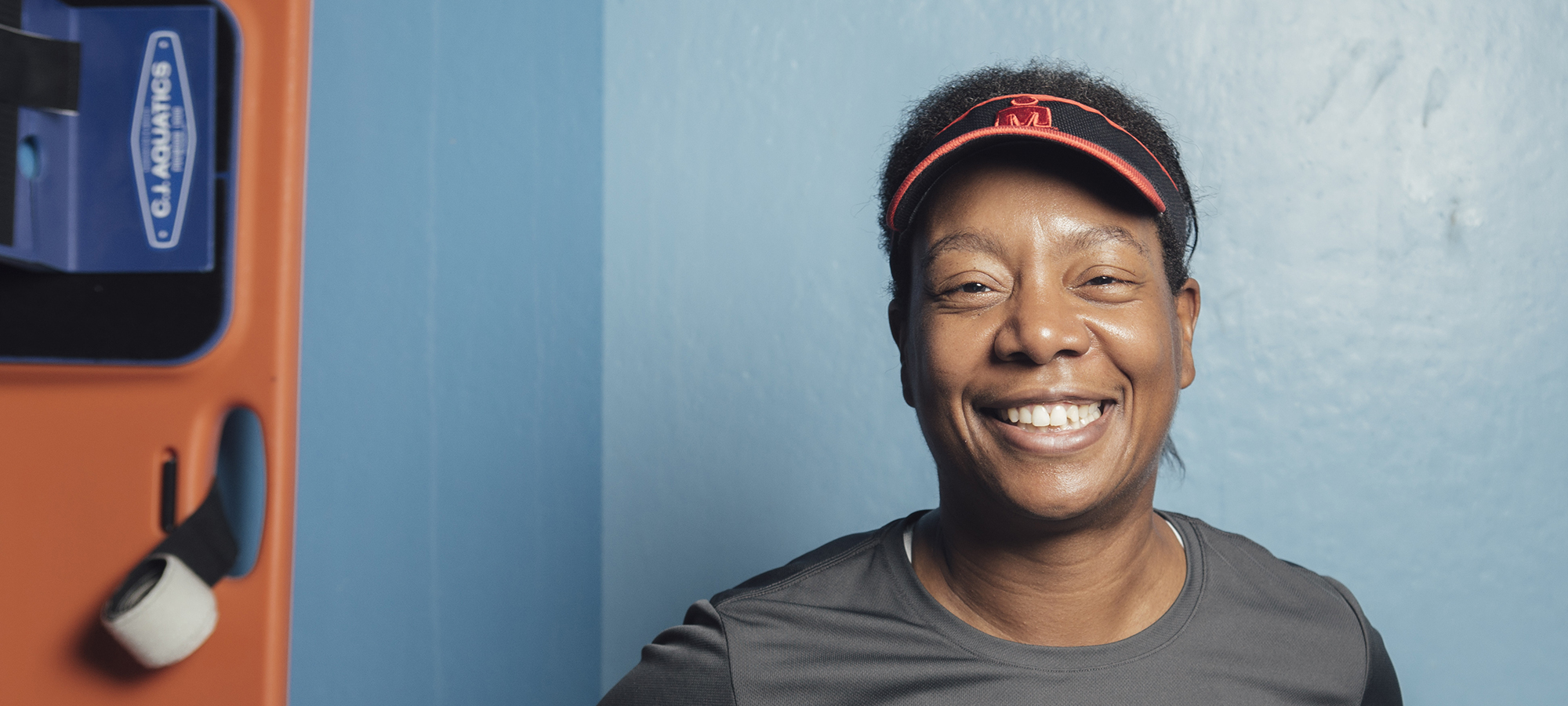



Sampson, 42, has completed one Ironman, four half Ironmans, a marathon, and more than 30 other triathlons and half marathons over the last ten years. She's currently in grad school full-time (for a Master of Science in Human-Computer Interaction at DePaul), has a full-time job (managing the websites for DePaul's Driehaus College of Business), and runs Faith Inspired Triathlon Training, a training program for women of color she founded on the south side of Chicago.
Interview by Julia
Photos by Jeffrey Marini

I was a nerd. Books and words were my world. When other kids were outside playing Red Rover or Sewer to Sewer—that’s what we’d call it when you’d run and have to get to the other sewer before anyone tagged you—I was inside reading Danielle Steele or [James] Michener. I didn’t like being outside. I never played sports. I never wanted to compete against anybody because I always thought I was going to lose.
I was born and raised in Chicago. When I was seven we moved to the Pullman area. Even though we were on the south side of Chicago and it’s supposed to be this horrible place, I had an idyllic childhood. My dad was in the marines, and when I was six or seven, he took me down to the YMCA, and that’s where I learned how to swim.
I was always a storyteller. I think I was in fourth grade when I decided I wanted to be a writer. I wanted to be Hemingway. My mom’s like, How are you going to afford that? If I was going to college, I was going to have to earn my way there. I was like, What can I do where I write, but they pay me? We got a newspaper every day, and I was like, oh, I can be a journalist.

After college I got hired as the cop reporter at the St. Joseph News Press. At the time I was swimming off and on, but not regularly, and was kind of heavy—over 200 pounds. I cannot remember when I wasn’t over 200 pounds until recently.
In 2004, I was hired [as an editor] at Compassion International, a global Christian humanitarian organization, and spent the next five years traveling around the world, writing about kids in poverty and the programs run by Compassion that helped them. I was dating this guy who was a multimarathon runner—he’d done like 30 marathons at the time. He invited me to do my first 5K. He did a 10K and I did a 5K, and I finished after him—it took me like an hour. But I did that 5K and I got a medal, and I thought, this is cool. So I started to swim. This trainer sees me swimming at the YMCA pool, and says, “You swim really well, you should do a triathlon. Most people don’t do triathlons because they can’t swim.” And I said, “Well, what’s a triathlon?”

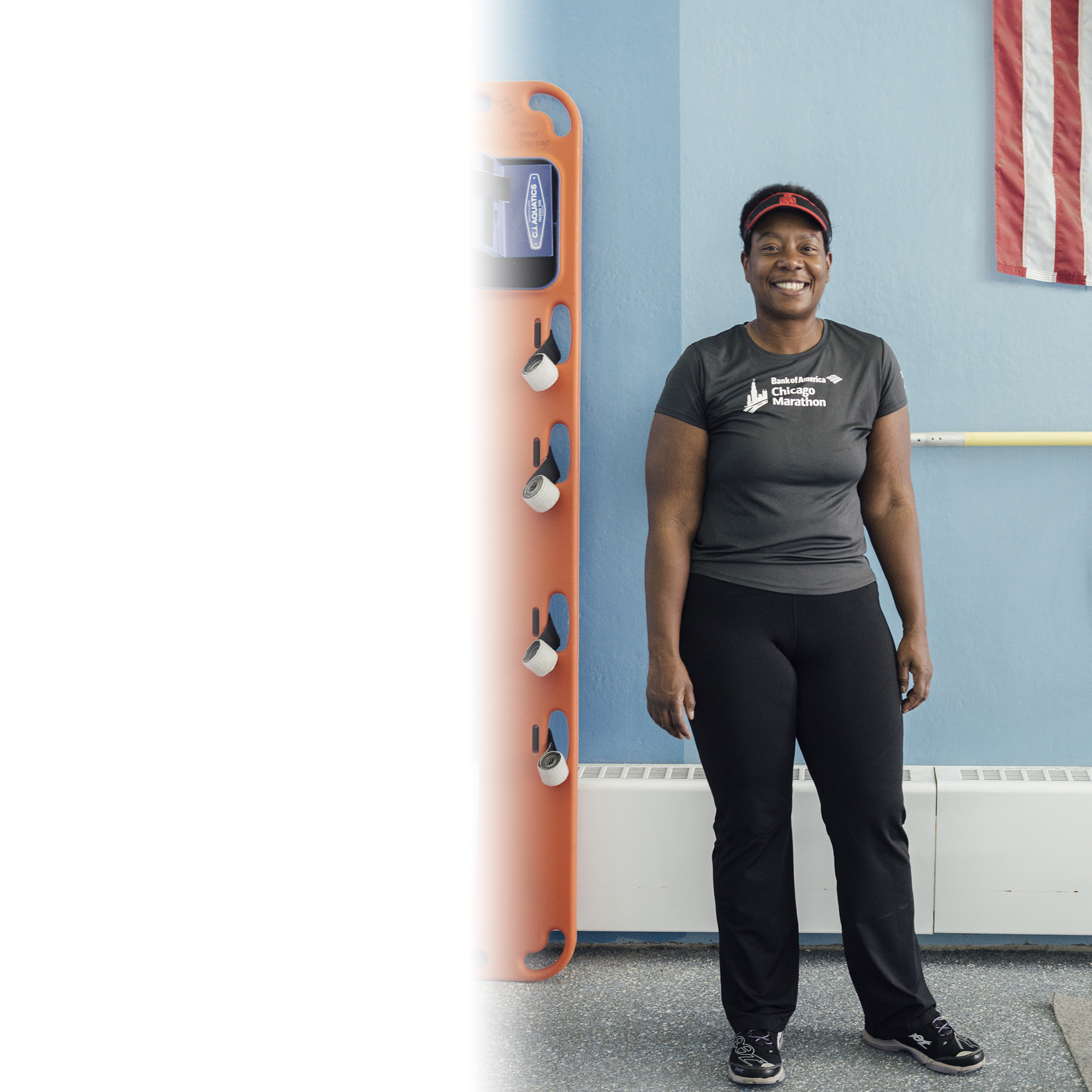
I find a site called beginnertriathlete.com. It talks about what you have to do, and I’m like, I’m fat, I can’t do that. I run into this lady in my swim class who’s going to do Danskin, an all-women’s tri. She says, you should do the swim part. She’s a runner, I’m a swimmer, her friend’s going to do the bike. I’m all geeked. Three weeks later she’s like, yeah, we’re not going to do it. I’m thinking, I still want to do this tri. But I don’t know anybody else. So maybe I’ll just sign up and do it myself.
At this time I couldn’t run more than two minutes without stopping. I didn’t even have a bike. So I go to a pawn shop, there’s a huge mountain bike for sale for $200, and I’m like, perfect!
Danskin is four months away and I’m like, I’ve got to do one before, just to try it out. Pueblo, Colorado, has a triathlon called Ordinary Mortals: a short swim in a pool, 12-mile bike, and a 5K. I’m like, I can do it, because I’ve done a 5K.
I get to the race transition area, try to set mine up with all the food and every piece of equipment I’ve ever bought. It’s ridiculous. I go into the pool, start swimming like a madperson. I’m out of breath. I’m just a mess. I’m the only black person there—besides [my friend] Denise, because I brought my own black person.
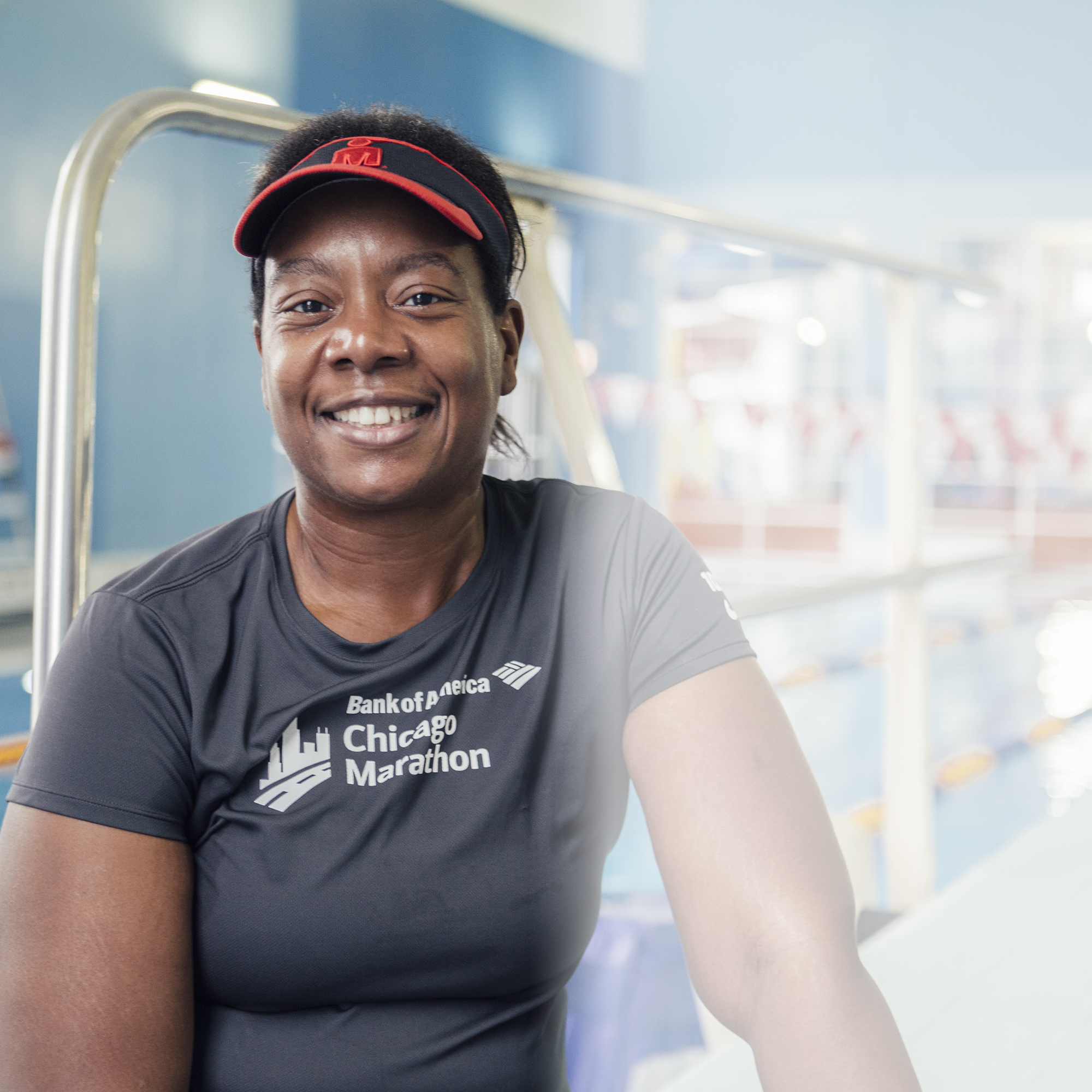
I get out, change in the locker room, get on my bike and proceed to cry for the next 12 miles because I’m on this like 90-pound bike going up hills. I run, and I see the finish line, and there’s Denise. She’s screaming, and there’s balloons. I’m last, or next to last. I cross the finish line, and it’s like gold rained down from heaven. I crossed the finish line and didn’t die. And I thought, I’ve got to do this again.
My next race was Danskin. I loved it. For some reason I go from hanging out on the couch to becoming a triathlete. I become an editor at Beginner Triathlete and write a story about Siri Lindley, who was number one in the International Triathletes Union two years in a row even without competing. I slowly progress, and then I sign up for a half Ironman in 2005. All my friends were doing it, and I said, oh, I can do it. A year after my first triathlon. Which is stupid. I would tell nobody to do that now. A half Ironman is a 1.2-mile swim, a 56-mile bike, and a 13.1-mile run, and I was nowhere near ready.
Siri Lindley was the emcee. I get out of the water, and she sees me, and over the microphone she's like, “Hi, Ovetta! Everybody cheer for Ovetta! She's doing her first half Ironman!” In my mind I'm thinking, how fast can I get to the parking lot with nobody seeing me? Because I was not ready to do this bike. But then Siri Lindley calls me out, and I'm like, I guess I can't go home. There are people running already. I get on my bike, and I start the loop, and it's hard. I'm sucking. It's hot. I want to quit. I get to transition, and Siri's like, “Now you just have to do the run!” I'm looking at her like, “Shut up. I'm not doing this run, I'm going to bed. And please stop telling people that I'm in this race.”
I can't even stand upright to put my running shoes on. The run is around this reservoir where there are no trees and it's 90-something degrees. I get to the turnaround, and everyone in the race has passed me. It's starting to rain, starting to get dark. The ambulance is behind me. There's no aid stations anymore.
And I'm like, I'm going to run until they tell me to get off the course. I'm running, crying, walking, walking, crying, running, just want to kill myself. This guy comes out on a bike. He's like, “Are you Ovetta? I'm Darren, I'm the race director.” I'm like, “Oh, you want me to get off the course?” He's like, “Oh no, I just wanted you to know that Siri Lindley is waiting on you at the finish line. She just wants to make sure you're OK.”

I get to mile 11 and look up, and I can see the finish line. The postrace party is all taken down. No tent, no chairs, no food. There’s nothing there but a clock and a woman with a megaphone. And I could hear her. “Ovetta! You’re almost there! You’re almost done!” She’s like, “Here she comes!,” as if it’s a stadium filled with people. I cross the finish line, and she’s like, “Ovetta, you did it! You’re a half Ironwoman! Woohoo!” She hugs me, she’s screaming. And it’s just me, her, and Darren.
I go home, and I get a call the next day from Darren. He said, “You won.” In triathlon they have this category called Clydesdale for men who are over 200 pounds, and Athena for women who are over 150 pounds. There were three women who’d signed up for that category, and two of them quit. I didn’t, so I got first place. I have this plaque, and it says “First Place, Long Course Triathlon.” People live all their lives, and they’ll never have a first-place podium.
In about 2008 I decide to sign up for my first Ironman—a bunch of friends were doing Ironman Coeur d’Alene. At that point I hadn’t run longer than 13 miles. I was only training ten to 15 hours a week for an Ironman, which is just stupid. The thing about Ironman is not just the distance, but they have a cutoff for every leg. The race starts at 7 [AM], you get until 9:20 to do the swim. You have to be off the bike and in transition by 5:30 [PM]. Then you have to be across the finish line by midnight or you don’t get a medal. You’re not an Ironman. The swim is 2.4 miles, the bike is 112, and the run is a full marathon, 26.2. So it’s 140.6 miles in 17 hours.
For the first time ever, I don’t finish a race. I missed the bike cutoff by about two minutes. And it’s very humiliating. They go, “Your race is over now,” snip off your timing chip, and you’re done. That was devastating.
Over the next few years I didn’t do any tries. I ballooned up to 285 pounds. I moved, got a new job, got married, got divorced, came back to Chicago. I’d lost pretty much everything financially. My 401K, which I had been saving since I was 19. My houses, which I had invested in when I was in my 20s. Two foreclosed, I did a short sale on the other one. 2008 to about 2011 were some really dark days. Here I was in my late 30s, the time when you’re supposed to be stable, and I was like a 19-year-old, moving back home with my parents. That was really humbling for me.
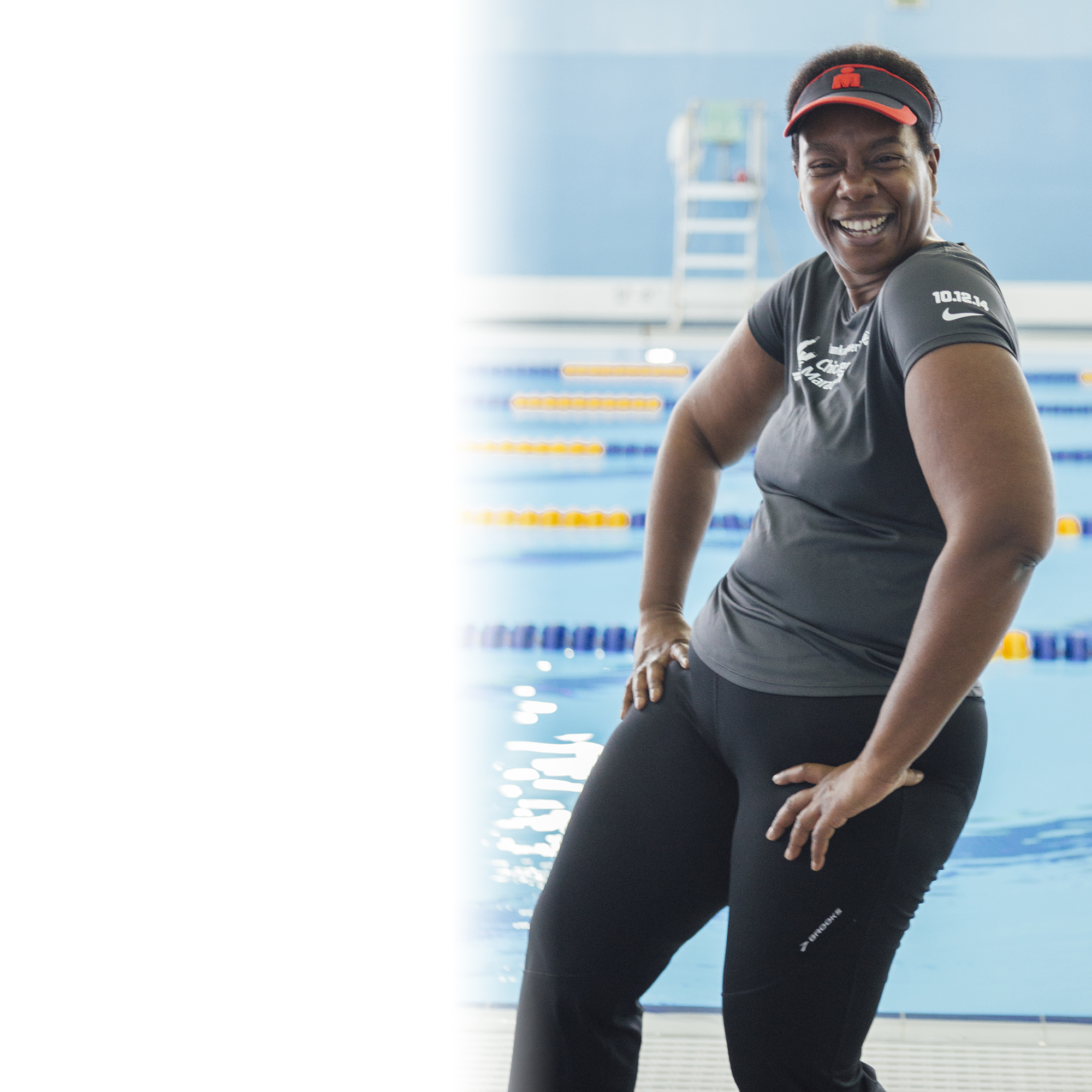
I was at a really low point, and the only thing that made me feel good was swimming. I joined the Chicago Tri Club and did a sprint race in Galena in 2011. In December of 2012, I did a 5K. It took me 50-something minutes. That day I got home and said, I’m going to do an Ironman. I had failed at everything. I had failed at my marriage, I had failed at trying to build my nest egg, I was failing financially. The idea that I had tried something and failed and had not tried again was too much.
I signed up in April for Ironman Cozumel in December [2013]. I found Well-Fit [Triathlon and Training], which had an Ironman training program that was 23 weeks. I walked in, and I was 265 pounds, and I said, “Make me an Ironman.” And they said, “Sure.”
It’s not a typical sporting event. It’s about your mental capacity to accept the impossible. They say faith is the evidence of things yet unseen. This is beyond faith. Because not only do you believe you can do it, it’s insane for you to believe it.
I was training between 20 and 30 hours a week. I was doing things with my body I had never even contemplated. I got faster on the bike and run, and much faster on the swim. I lost 100 pounds. I didn’t care about being thin, I just wanted to be faster on the bike.
I went to Cozumel and I was ready. The minute I got in the water and took that first stroke, I knew I was going to finish. I was so ecstatic to get off the bike that I completely forgot I still had to run a marathon. I was four miles in and I was like, shit, I have 22 miles to go!
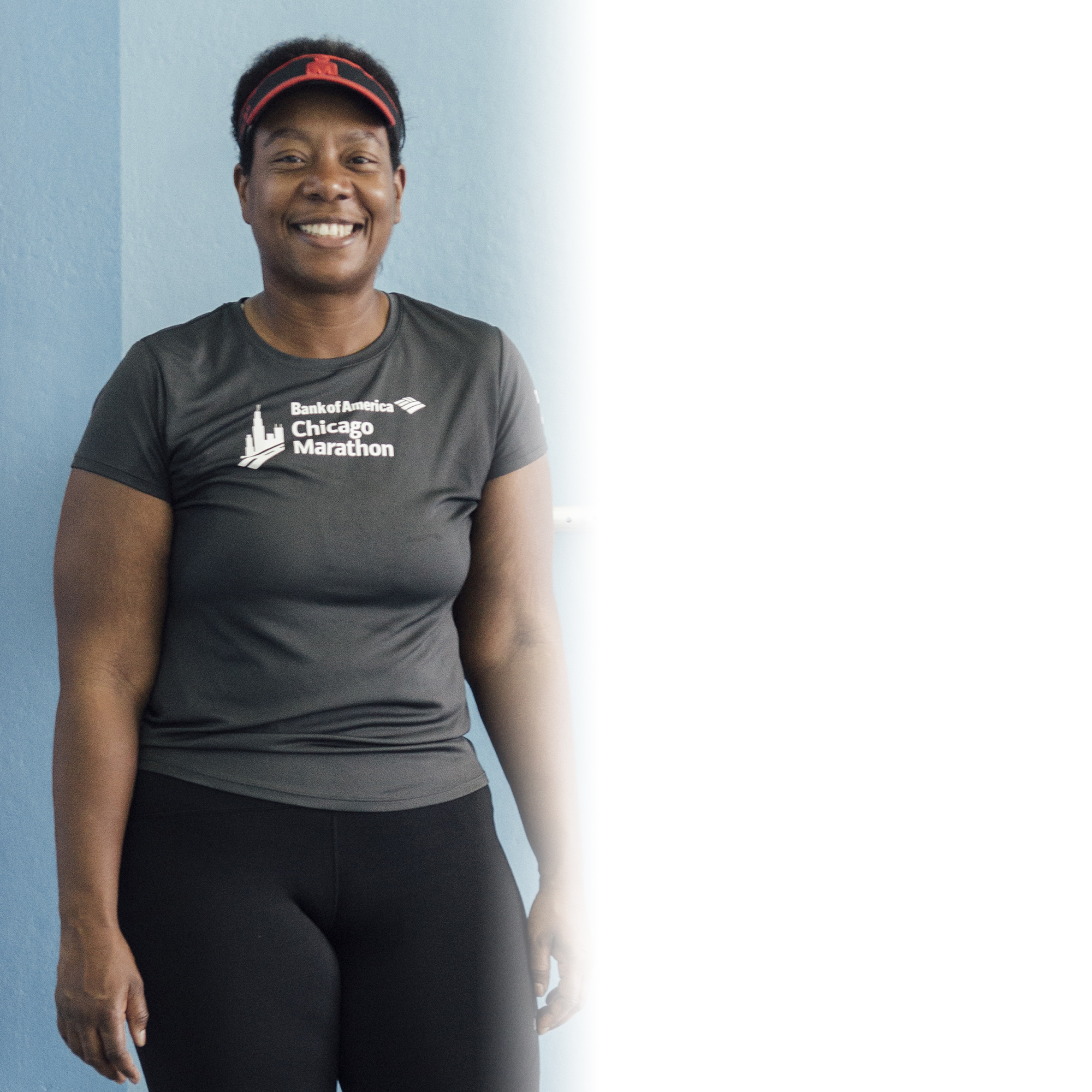
When you run into town you can hear the announcer, the crowd cheering. On that last loop, it’s indescribable. It’s so much of a relief and a joyous feeling. Crossing that finish line and hearing “Ovetta Sampson, you are an Ironman” was the culmination of everything that I felt I deserved as a person who decided to commit to something special. I think everyone deserves that.
Once I became an Ironman, it was like people thought I was Oprah or something. They listened. It started as a personal thing, but it became a platform for me to help other people to reach their goals. That’s why I created Faith Inspired Triathlon Training [FITT], because I wanted other people to step up to experience what I experienced. So many women can do what I did; I’m not superhuman.
This is changing the face of what it is to be an athlete. [My student] Angela always says, “I saw you, a person who looks like me, doing something I wanted to do.” We have this nucleus of fitness on the south side of Chicago that’s just blowing up that no one talks about. There’s Men Run Deez Streets, Women Run the World, Black Girls Run, Major Taylor Cycling Club of Chicago. And it’s allowing people to tell their fear to go to hell.
Yesterday [November 23] was the culmination of 12 weeks of training for FITT’s first group of athletes. We took people who would not put their face in the water, who wouldn’t leave the shallow end, and they all did a tri yesterday, every single one of them. They were amazing. I’m so inspired by them. I wrote the program, but they built the team.
If I have to train everybody so we can do races together, I’m good with that. I built the program that I wanted, that I wish I’d had.
















